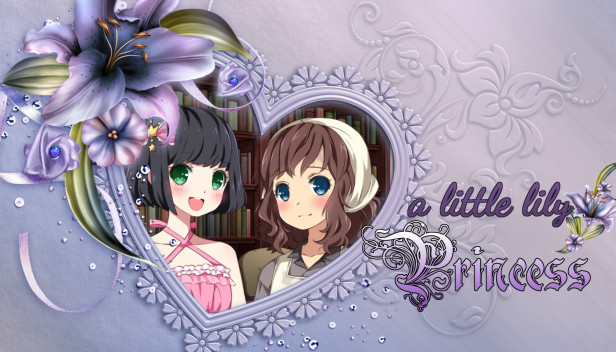
Now, I know what you’re thinking: “What?! Why would anyone adapt a classic Victorian era novel into a visual novel?! This is gonna suck soooooo bad!” Yeah, adapting a Victorian novel into a video game is definitely not the norm. Was anyone really expecting this? And did anyone even want such a thing to happen? Well, Hanako Games thought it’d be a great idea, and they made A Little Lily Princess. Now, as of this review, I’ve finished this game, read the book, and I’ve seen three adaptations of Frances Hodgson Burnett’s A Little Princess so far: The 1993 movie, the 1986 British mini-series/movie starring Amelia Shankley, and the 1985 anime adaptation, the latter two I think are some of the best adaptations. I can definitely say for sure that A Little Lily Princess is up there with those two in that it’s one of the most well executed, well thought out adaptations of Burnett’s novel, though I won’t deny that it does have some flaws that prevent the game from being truly great.
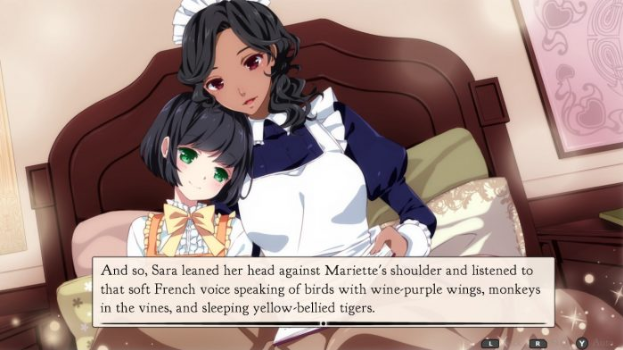
The story is very much the same as the novel: Little rich girl Sara Crewe is sent to England by her loving British Army Officer father, Ralph, to go to a special school for girls so she can have a good education and become a good lady befitting Victorian England of the time. The Seminary for Young Ladies is ruled by a cold, cross woman named Maria Minchin, who doesn’t like Sara but thinks giving her what she wants will mean good publicity for her school. Sara becomes popular for her social status and makes all sorts of friends, from the hapless school dunce Ermengarde to little tantrum-throwing Lottie to shy, overworked, and emaciated scullery maid Becky. Her status also brings forth ire, as she is picked on by snob Lavinia Herbert and taken advantage of by Miss Minchin. But Sara remains kind and generous to everyone she meets, excels at school, and is due to receive a massive fortune in diamond mines. However, one day, her father falls ill and dies, and due to circumstances beyond everyone’s control, Sara is left penniless. With no known relatives to take her, Miss Minchin is appalled by the amount of debt she’s in. Blaming Sara for her plight, she takes everything away, forcing her to become a servant in the school, being treated worse than a slave by everyone around her. Sara tries to survive, but isn’t sure if she can do it.
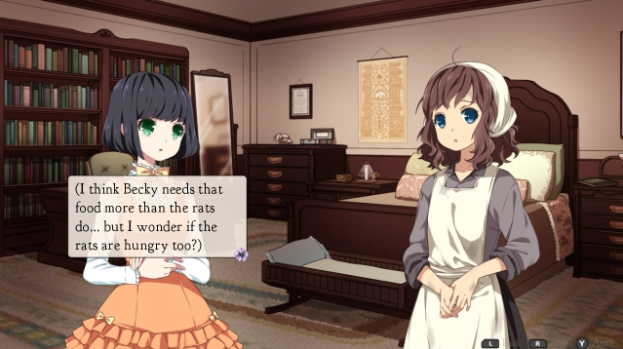
What makes A Little Lily Princess different is that, since it’s in a visual novel format, you can have Sara become friends with one of six people: Becky, Ermengarde, Mariette, Lottie, Jesse, and Lavinia, and depending on the choices you make and the points you accumulate from doing certain activities such as playing with toys, dancing, having tea parties, etc., you can use the points you gather in order to access scenes where Sara interacts with the characters, some of which are important for progressing the story. If you get far enough, you go through the story with the character of your choice, and things happen differently depending on who you chose to befriend. Yeah, one of the selling points of this VN? Some of the characters are lesbians! Not even kidding. Don’t worry, the girls don’t do anything beyond hugging, hand holding, and the occasional passionate kiss, so you can let your kids play it.
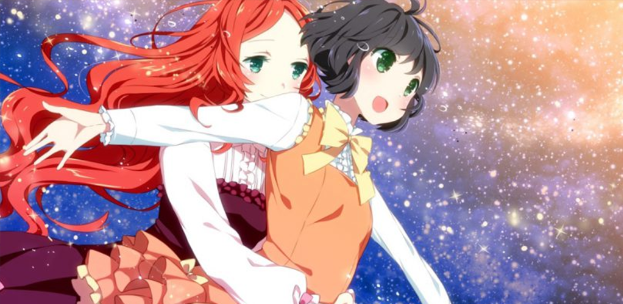
For the most part, the characters are true to their counterparts in the novel. Sara is still a nice, sweet girl, Becky is the skittish, abused scullery maid, Lottie is a spoiled brat, Lavinia’s an annoying rich girl, etc. But what makes A Little Lily Princess stand out from other adaptations is that it adds many more little tid-bits, layers, backstories, and extra personality to every one of the characters except for Miss Minchin, even characters who never got any screen time in the novel, Mariette and Jesse being two of the most prominent recipients of this treatment. In the book, Jesse was just Lavinia’s sidekick and didn’t do much of anything. Here, the game gives her a whole backstory and well-rounded personality from whole cloth, and an entire arc dedicated to her that gives her a lot of much needed depth and substance. I’ve read on many discussions on this game that Jesse’s route is one of the most popular and well-liked, and I can certainly see why. Mariette also goes from just being Sara’s maid to a worldly, kind-hearted but still firm and stern woman who, while she does love Sara dearly, is hardened from bad experiences from her past and hates that she can’t do much to help Sara in her time of need.
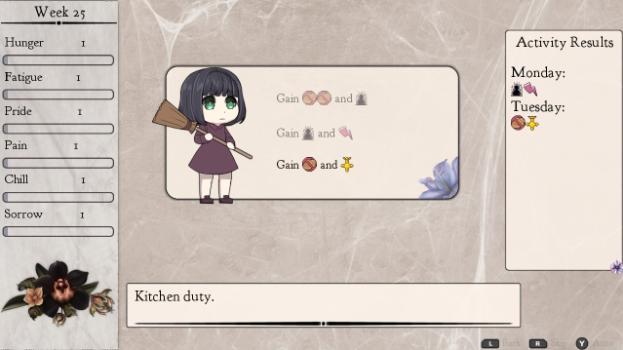
Even Ermengarde, Lottie, Becky, and Lavinia aren’t exempt from character development, and the new tid-bits the game adds to them really make them shine like no other. They feel more like people rather than random character archetypes. It also helps that the game also adds in extra scenes devoted to showing the various characters interact that weren’t present in the book, which I feel made ALLL feel much more enriched and enlivened. Even Sara, who could easily be mistaken for a perfect Mary Sue type of character, is given much more flaws, more so than the book, such as not always keeping herself composed, being a little bit of a snarker, trying too hard, prying too much into someone’s past, and having her succumb to despair a bit more easily than other adaptations did. Any route you choose will expose a flaw of Sara’s that plays a part in progressing the story, which is absolutely wonderful and a great way to utilize opportunities for character development.
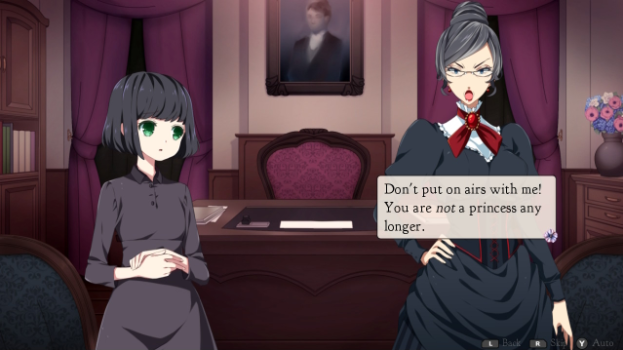
Unfortunately, as much as I praise the decisions made for those characters in this game, the same cannot be said for Miss Minchin. She is the only one in the game who doesn’t get any kind of development, nor does she ever get fleshed out. She remains the stereotypical evil teacher through and through. Having her stay this way can make the story’s message feel a bit preachy and cliche. I guess this is because I was spoiled through the 1985 anime version, which went way out of its way to show Miss Minchin far more sympathetic and human than any other adaptation did, while keeping her purpose in the story and giving time to show why she became the way she is and why she resents Sara so much. Plus, here, Miss Minchin doesn’t get much comeuppance in the end, and I think one reason why she doesn’t get called out for her actions much in this game is the fact that for SOME reason, Hanako Games cut Amelia out entirely. Uhhh…why? Where the heck is Amelia? I can understand not showing Sara’s father, but Amelia? What was the point of cutting her out? Amelia calling out Miss Minchin is one of the best, most cathartic scenes in both the novel and anime!
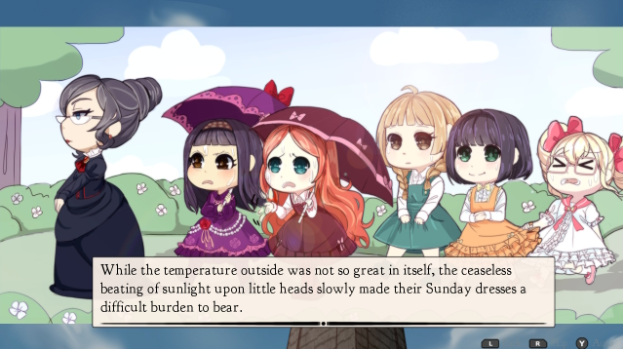
As far as faithfulness to the novel, other than a few characters being cut out entirely, most of the changes are cosmetic in nature, such as not adapting the first chapter or the last one in its entirety, having certain famous scenes from the book restricted to certain routes (The scene where Sara, Ermengarde, and Becky pretend to have a banquet in the attic, in the chapter called The Magic, is restricted only to Ermengarde’s route, and Lottie’s learning of Sara’s circumstances is also only accessible in her route), Carmichael’s family not showing up, etc. Most of the changes don’t really affect much in the long run, and the basic story is still the same. To the game’s credit, they actually add more than they cut out, which works because video games aren’t governed by certain restrictions unlike stuff like TV shows and movies, which gives the creators more freedom to adapt the story however they please.
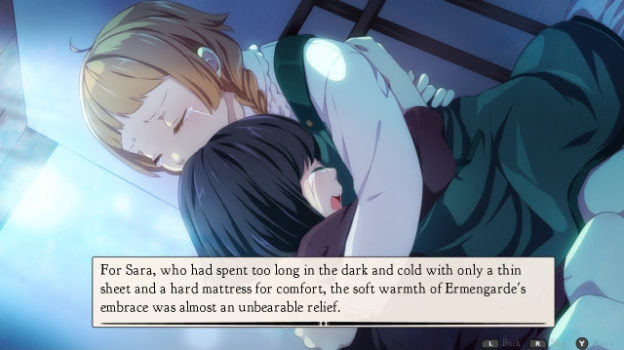
It also helps that the game pretty much uses whole lines and paragraphs taken straight from the book, but manages to integrate them into the story in ways that make sense. In my review of the book, I mentioned that the purple prose could be a bit pretentious at times, but a lot of the time in this game, the passages used are either tweaked some to make more sense in context, and various scenes are either long or short, making the prose a lot more digestible. It also helps that the producers added some of their own text passages into the story, not only managing to replicate Burnett’s writing style, but also adding to them so the story progression makes more sense. The story itself is pretty linear, and never changes even if you chose a girl to befriend, even with additional scenes with Miss Minchin that lead to Ram Dass sprucing up Sara’s attic, which are different in every route.
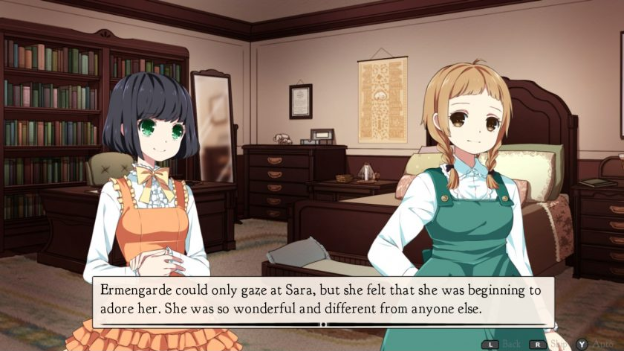
One other gripe I have with the game is the character designs. Now don’t get me wrong, I like them, but the embellished, stylized, costume-y nature of the girls’ outfits make them all feel gratuitiously out of place in a setting like Victorian era London. I mean, Sara, Ermengarde, and Mariette look fine, but Jesse looks less like a Victorian era everygirl and more like she could be Rose from Tales of Zestiria’s long lost twin sister. Or Shirayuki from Snow White With The Red Hair if she didn’t cut her hair. I mean, none of the characters would look out of place in a cutesy moe slice-of-life anime, but in Victorian era London? I don’t think so. I also think the designers tried a bit too hard with Miss Minchin’s design and made her look too much like an evil, sexy villain, giving her nature away right off. This is another thing the 1985 anime excels in, because there, the characters all had simple, sensible outfits fitting for the time period, and even when the characters dressed in grand, fancy outfits, they remained true to the time period. Even Miss Minchin looked like a shrewish but sensible old woman, one who you could easily see as just an old woman, nothing more, nothing less. In ALLL, Sara’s pink princess outfit looks way too much like a cute magical girl outfit, and you definitely don’t see super short poofy skirts, pink bloomers, dresses with wings on them, and thigh high stockings in Victorian era London. I’m not an expert on period fashion, but I know enough that some of the outfits the characters wear in ALLL would be considered scandalous, and that era definitely had strict, conservative views on fashion, and the outfits the characters wear in ALLL definitely wouldn’t fly in that time period. Oh, and Ram Dass looks less like a realistic Indian man and more like he came straight out of Magi: The Labyrinth of Magic. The 1985 anime version’s design made him more simple yet realistic and didn’t try to embellish his clothes one bit.
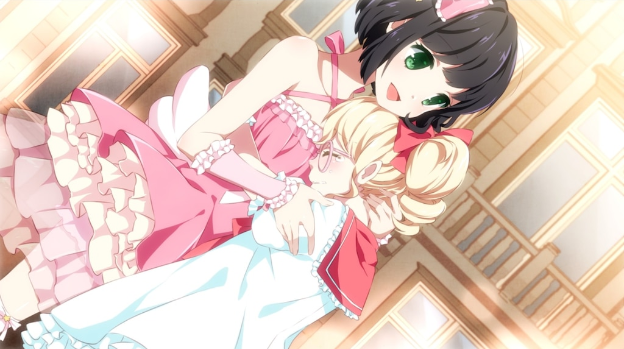
But does all of this hurt my enjoyment of the game? Hell no! Yeah, it’s an unorthodox choice for a video game, but Hanako Games went through with their idea and made something good out of it, which is always fine with me! It’s a pretty easy game to breeze through, and you’re given the option to skip scenes you already went through, so you can view any that you haven’t seen, which is good for those who lack patience. But in a way, this, along with the linear story, may make the game a bit too easy for some. I had no problem with it. Sometimes it’s just nice to play through something that just requires you to sit back and relax, without worrying about fighting boss battles or gathering items. A Little Lily Princess may not be the best game ever, I can name at least three that I like a lot more, but it’s definitely a cute game that shouldn’t be left by the wayside and has a lot to offer for both yuri fans and fans of the book. Out of all the adaptations I’ve seen, I think A Little Lily Princess is high up there in terms of faithfulness to the novel and for just being genuinely good. It cuts out only the excess fat, adds in more substance and meat to make it rich, and is still a rewarding experience without getting rid of what made the book so great.
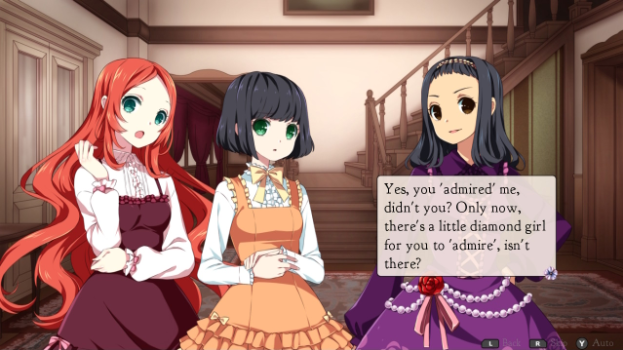
Whether you’re a hardcore gamer, casual gamer, or just want a little time killer, A Little Lily Princess has something to offer for anyone willing to give it a chance. After having played a few visual novels recently, this one included, as of this writing, A Little Lily Princess is my favorite visual novel of all time, which is high praise from me considering this is technically an indie game. Also, don’t worry. There’s no explicit sexual content despite the genre and format (Visual novel, yuri genre), so you can let your kids play it.
